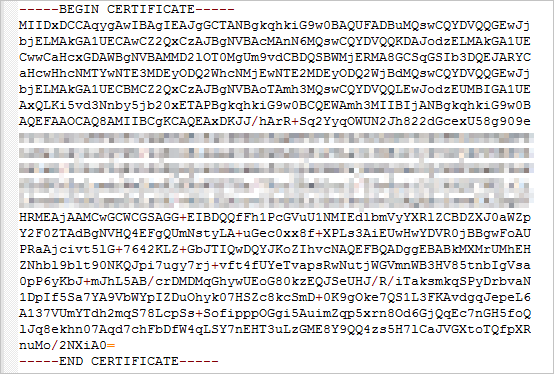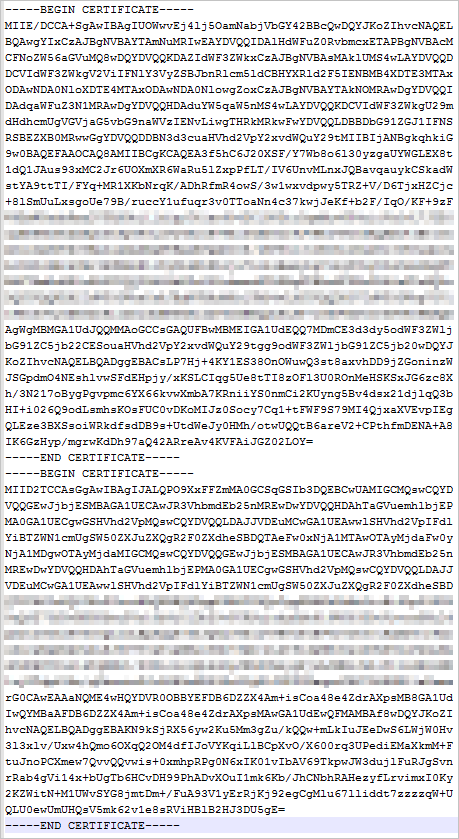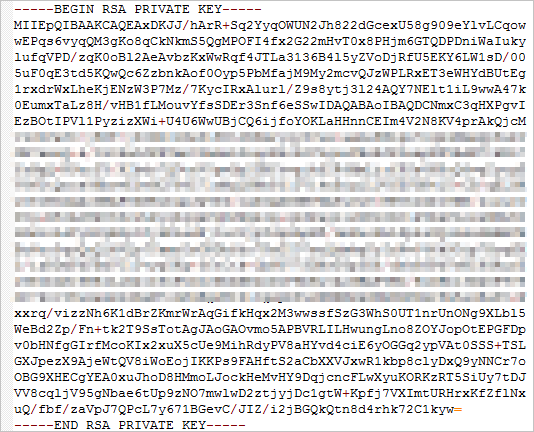Dynamic Content Delivery Network (DCDN) allows you to upload certificates and private keys only in the PEM format and has different requirements for certificates that are issued by different certificate authorities (CAs).
Certificates issued by a root CA
Root CA certificates are issued by root CAs, such as Apache, IIS, NGINX, and Tomcat. Each root CA certificate is unique. SSL certificates that are used by DCDN are issued by NGINX. Each certificate includes two files with the name extensions of .crt and .key.
Open the NGINX folder and use a text editor to open the .crt file. Then, you can view the certificate content, as shown in the following figure.
Figure 1. Certificate in PEM format 
Certificate in PEM format
The certificate must start with "-----BEGIN CERTIFICATE-----" and end with "-----END CERTIFICATE-----".
Each line (except for the last line) must contain 64 characters. The last line can contain 64 or fewer characters.
Requirements for certificate upload
You need to upload all content of the certificate that starts with "-----BEGIN CERTIFICATE-----" and ends with "-----END CERTIFICATE-----".
Each line (except for the last line) must contain 64 characters. The last line can contain 64 or fewer characters.
Certificates issued by an intermediate CA
A certificate file that is issued by an intermediate CA contains multiple certificates. When you configure HTTPS, you need to combine the intermediate certificates and server certificate into a complete certificate before you upload the certificate. The following figure shows an example of a complete certificate.
Figure 2. A complete certificate in PEM format
Format of the certificate chain
The certificates that are issued by an intermediate CA are in the following format:
-----BEGIN CERTIFICATE-----
-----END CERTIFICATE-----
-----BEGIN CERTIFICATE-----
-----END CERTIFICATE-----
Combination rules
Use a text editor to open all *.PEM certificate files. When you combine the certificates, the first certificate must be the server certificate and the intermediate certificates follow the server certificate. Do not add space characters between certificates. The CA that issues the certificates may also provide instructions. Take note of the instructions.
RSA private key formats
The extension of a private key file is .pem or .key. Use a text editor to open the private key file. The following figure shows an example of a private key file.
Figure 3. RSA private key formats
Private key in PEM format
The private key must start with "-----BEGIN RSA PRIVATE KEY-----" and end with "-----END RSA PRIVATE KEY-----".
Each line (except for the last line) must contain 64 characters. The last line can contain 64 or fewer characters.
Requirements for private key upload
Before you upload an RSA private key, run the openssl genrsa -out privateKey.pem 2048 command on your on-premises machine to generate a private key. The privateKey.pem file is the private key file.
The private key must start with "-----BEGIN RSA PRIVATE KEY-----" and end with "-----END RSA PRIVATE KEY-----".
Each line (except for the last line) must contain 64 characters. The last line can contain 64 or fewer characters.
If you want to generate a private key that starts with "-----BEGIN PRIVATE KEY-----" and ends with "-----END PRIVATE KEY-----", run the following command in OpenSSL to convert the format. Then, upload the content of the new_server_key.pem file and the certificate.
openssl rsa -in old_server_key.pem -out new_server_key.pemConvert certificate formats
The HTTPS feature supports only certificates that are in the PEM format. If your certificates are not in the PEM format, you need to convert the certificates into the PEM format. We recommend that you use OpenSSL to convert certificate formats. The following section describes how to convert certificates to the PEM format:
The CRT file name extension is short for certificate. The certificate may be in the PEM or Distinguished Encoding Rules (DER) format. Before you convert the format of a certificate, check whether you need to convert the certificate into other formats.
PEM is a text format. It starts with " -----BEGIN ***-----" and ends with "-----END ***-----". The content between these lines is Base64-encoded. The certificate and the private key can be saved in this format. To distinguish a certificate from a private key, the extension of a private key file that is in PEM format is
.key.
Convert a certificate format from DER to PEM
In most cases, the DER format is used for Java.
Convert the certificate format:
openssl x509 -inform der -in certificate.cer -out certificate.pemConvert the private key format:
openssl rsa -inform DER -outform pem -in privatekey.der -out privatekey.pem
Convert the certificate format from P7B into PEM
In most cases, the P7B format is used for Windows Server and Tomcat.
Convert the certificate format:
openssl pkcs7 -print_certs -in incertificat.p7b -out outcertificate.cerOpen the
outcertificate.cerfile. Then, copy and upload the part that starts with "-----BEGIN CERTIFICATE-----" and ends with "-----END CERTIFICATE-----".Convert the private key format:
A certificate in the P7B format does not include a private key. When you configure an SSL certificate in the DCDN console, specify the certificate information. You do not need to specify the private key information.
Convert the certificate format from PFX to PEM
In most cases, the PFX format is used for Windows Server.
Convert the certificate format:
openssl pkcs12 -in certname.pfx -nokeys -out cert.pemConvert the private key format:
openssl pkcs12 -in certname.pfx -nocerts -out key.pem -nodes